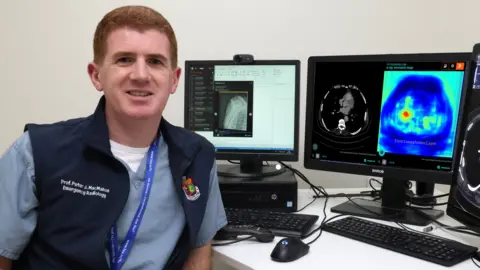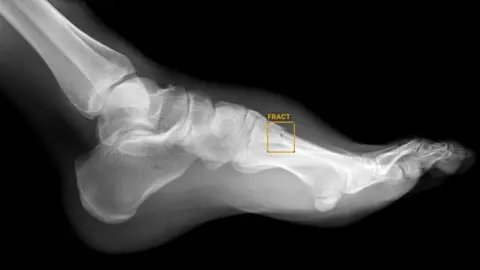Know-how Reporter
 Mater
MaterFor a rustic well-known as Massive Tech’s European tackle, Eire’s hospitals typically lag far behind in know-how.
They lack shared computerised affected person data, or distinctive identifiers to trace folks after they transfer between clinics.
In July 2024, a pc system failure made Dublin’s Mater hospital push again surgical procedures and beg folks to not come to its A&E.
Three years earlier than, Russian ransomware attackers shut down the Irish well being system’s whole laptop community, and printed 520 folks’s medical data on-line.
However Eire now has formidable objectives to modernise its healthcare.
That features a programme called Sláintecare. Introduced in 2017, the plan is to make use of a few of its €22.9bn (£20bn; $24bn) finances surplus to create a healthcare service that’s free on the level of care, just like the UK’s or Canada’s.
To enhance healthcare, pinch factors like diagnostics should be improved.
It is an issue being tackled at Dublin’s Mater hospital, 164-years-old and the situation of Eire’s busiest emergency division.
That is particularly so in winter, when someday early this January Irish A&E departments had 444 folks on trolleys ready to be seen.
“In Eire, the large downside we’ve is ready lists, and specifically ready for diagnostics, for MRI [magnetic resonance imaging] or CT [computed tomography] scans,” says Prof Peter McMahon, a advisor radiologist on the Mater.
Due to Prof MacMahon, who as a medical scholar dabbled as a hobbyist programmer, the Mater is now among the many first hospitals in Eire to make use of synthetic intelligence (AI) throughout its radiology division – the a part of a hospital offering medical imaging to diagnose illnesses and information therapy.
To ensure sufferers with essentially the most pressing wants are seen first, Prof MacMahon says: “We use AI to right away analyse all head scans for bleeds, all chest scans for blood clots, and all bone x-rays for fractures.”
The AI is especially useful in helping youthful docs, after they haven’t got skilled consultants to show to.
“Now a nurse or junior physician at 2am is not alone, they have a wing man,” he says.
 Mater Hospital
Mater HospitalRural hospitals face totally different sorts of challenges.
Letterkenny College Hospital in Donegal is with out MRI services at evenings and weekends.
At the moment, a affected person urgently needing an MRI scan at evening can face an ambulance trip to Dublin.
However now, Prof MacMahon and the Mater’s AI analysis fellow Paul Banahan have educated a trial AI mannequin to create a “artificial MRI” from CT scans, to right away triage sufferers with suspected spinal accidents.
That was performed by feeding a “generative AI” mannequin round 9,500 pairs of CT and MRI photographs of the identical space on the identical individual.
Now the AI can predict what the MRI scan would appear to be from the CT scan, one thing accessible in all emergency departments.
And since radiology scans additionally include docs’ textual content stories, he’s additionally exploring utilizing giant language fashions to determine essential illness patterns and traits.
 Peter MacMahon
Peter MacMahonMaking use of AI to medical photographs in Eire is simpler for the reason that nation has saved scans in a central, digital submitting system since 2008.
However a whole lot of different essential info, like medical notes or electrocardiograms (ECGs), stays largely in paper format in most Irish hospitals, or in smaller databases that aren’t shared centrally.
That can “severely delay” making use of AI to identify potential illnesses and enhance scientific care, factors out Prof MacMahon.
Ageing IT methods in Irish healthcare are extra broadly a problem.
“Fairly bluntly, a whole lot of hospitals are coping with legacy IT methods the place they’re simply making an attempt to maintain the present on the street,” says Dr Robert Ross, a senior laptop science lecturer at Technological College Dublin.
“Doing anything like integrating AI will not be straightforward to do,” he says.
Utilizing AI in healthcare will not be with out issues.
An instance right here is AI speech-recognition instruments. Utilizing them might let docs spend much less time on note-taking and report writing.
However some have been discovered to make things up, together with to invent non-existent medicine.
To forestall such AI from hallucinating, “you have to be sure it is penalised in its coaching, if it offers you one thing that does not exist,” says Prof MacMahon.
AIs can have biases, however “people have biases too”, he factors out.
A drained physician, anticipating a younger affected person to be wholesome, can overlook their blood clot.
“For no matter purpose we’re way more open to just accept human error”, than in new well being know-how the place “the appropriate danger is zero”, says Prof Seán Kennelly, a advisor at Tallaght College Hospital and professor at Trinity School Dublin.
This implies we “proceed with the phantasm of 100% accuracy in people”, and ignore areas the place AI-supported know-how could make higher scientific choices, he says.
 Tallaght College Hospital
Tallaght College HospitalHealthcare regulators, who have already got a “weak sufficient” understanding of software program as a medical gadget, have not in any respect caught up with guidelines for AI, says Dr Aidan Boran, founding father of an Irish medical tech start-up known as Digital Gait Labs, and a researcher at Dublin Metropolis College.
For instance, getting a CE mark, which reveals {that a} medical gadget meets EU security laws, contains offering particulars concerning the manufacturing unit the place the product is manufactured.
However within the case of software program that isn’t related says Dr Boran. “For us, manufacturing actually means copying software program,” he factors out.
AI can have a black field downside: we are able to see what goes in them and what comes out, however the deep studying methods that energy these fashions are so advanced that even their creators don’t perceive precisely what occurs inside them.
That may create difficulties for a health care provider making an attempt to elucidate therapy choices that contain AI, says Dr Paul Gilligan, head of St Patrick’s Psychological Well being Providers, certainly one of Eire’s largest psychological well being suppliers that runs St Patrick’s Hospital in Dublin.
When AI influences their choices, docs must “have the ability to articulate the reasoning behind these choices in a way that’s accessible and comprehensible to these affected,” he says.



